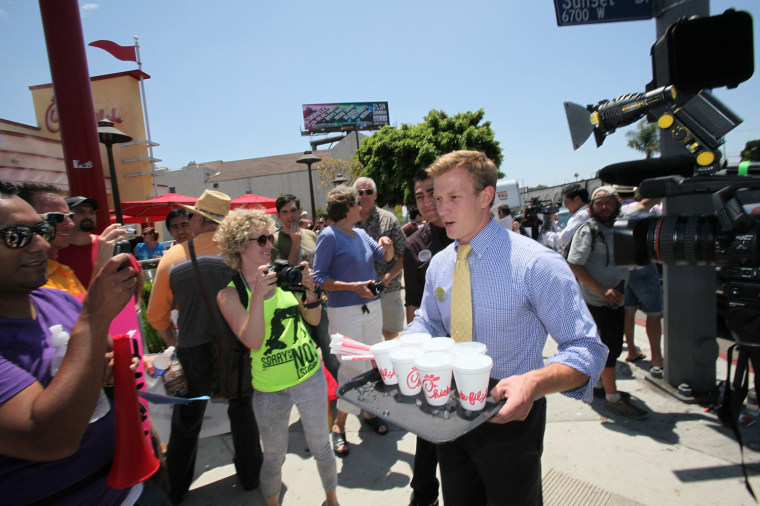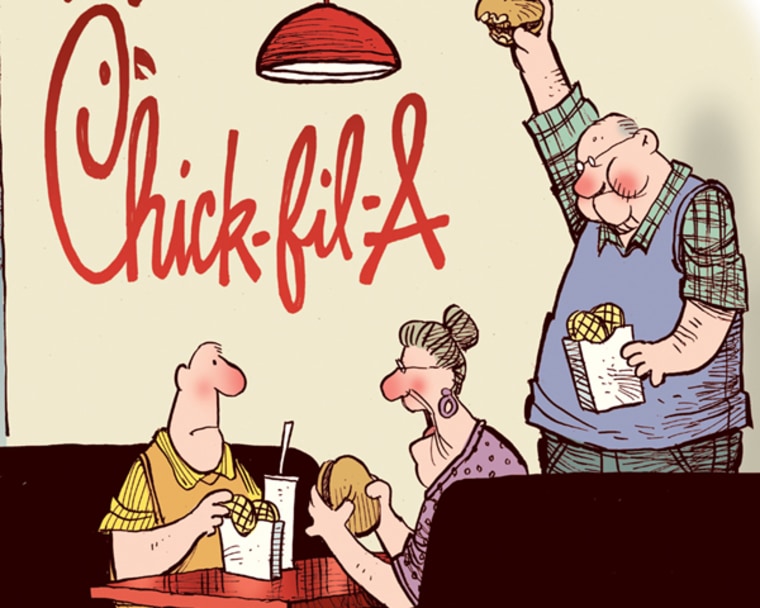
(Updated 8:05 p.m. ET) In the 20th century India's Mahatma Gandhi famously used the hunger strike as political protest. In America today we demonstrate by eating fast food.
Call it an “eat-in,” call it a “buycott”: By whatever name, it’s a tactic that’s growing in popularity. As Wednesday's Chick-fil-A Appreciation Day indicates, it’s a form of protest Americans find increasingly easy to swallow.
“This is a convenient way to protest or to make a statement,” said Jean Kinsey, director emeritus at The Food Industry Center at University of Minnesota. And unlike a boycott, “It’s more of a proactive statement. The proactive element might be more attractive to some people.”
Americans have been wearing their political feelings on their napkin increasingly often.
Last month protesters in New York City brought giant cups to the “Million Big Gulp March” to express opposition to Mayor Michael Bloomberg’s proposed ban on soda fountain drinks larger than 16 ounces. This week, lawmakers from Iowa and Texas called for “Meat Monday” in response to a USDA promotion of “Meatless Mondays” that the agency has since withdrawn.
But by far the largest such food-related “buycott” was Chick-fil-A’s, sparked by President Dan Cathy’s remarks to a religious publication about his support for the “Biblical definition” of marriage. Gay rights groups called for a boycott, and Cathy’s supporters pledged to bring business to Chick-fil-A en masse.
A Facebook event page launched by former Arkansas Gov. Mike Huckabee had more than 668,000 people listed as “attending” the chicken chow-down.
Chick-fil-A executive vice president of marketing Steve Robinson told NBC News the result was a "record-setting day" for the chain and its 1,600 outlets, although the privately held company declined to offer specifics. Sam Hamadeh, CEO of research firm PrivCo, estimated that if the protest could have brought in $8 million in extra revenue for Chick-fil-A, assuming it got a 50 percent bump in daily sales.

“We were so busy we nearly ran out of food,” one Chick-fil-A worker told The Daily Beast. "We did run out of some things, like nuggets, strips, lemonade, and waffle fries.”
The event spawned smaller eat-in movements — on both sides of the issue — around the country. WMC-TV in Memphis reported that the Tennessee Equality Project rallied supporters at a rival KFC restaurant, while a Wendy’s franchisee in the Carolinas courted Chick-fil-A spillover traffic with the signboard message "We stand with Chick-fil-A.” (A Wendy’s spokesperson told WBTV that the sentiment expressed the view of the franchisee, not the company.)David Just, professor of applied economics at Cornell University, said Americans can expect to see more protest eating in the future.
“Food is something people tend to get really emotional about,” he said. “People have seen that this is something that’s easy to promote with social media. ... you can tap into strong feelings people have.”
For many Americans, the idea of eating "forbidden fruit" like fried chicken sandwiches and french fries already taps into a rebellious spirit.
“You get that confluence," Just said. "This food is under threat already, and then you have these other currents going on."
An eat-in of oatmeal or spinach might not be quite as appealing.
Just predicted big food companies are watching the trend and waiting for an opportunity to turn a buycott into a business bump.
“It’ll be really interesting to see how they try to use this,” he said. Since many such movements now are popularized on social media sites, food companies are likely to focus their attention there
But companies can face a risk if they try to capitalize on a protest.
The Skittles brand suffered a a backlash after the death of Trayvon Martin, an unarmed Florida teen who was carrying the candies when he was shot in February. Skittles became a popular prop for protesters, but the Mars subsidiary Wrigley, maker of Skittles, was assailed for failing to reciprocate by making a donation or other show of support.
“When it comes to something like this, you’re playing with fire a bit,” Just said.
More money and business news: